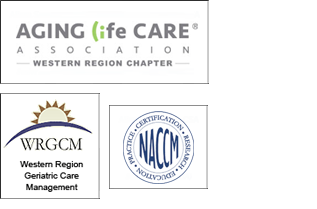Let’s Talk About How We Talk About Dementia
June 1, 2018 —An estimated 350,000 Coloradans are affected by dementia. This number is almost as large as the population of the city of Aurora, or that of the cities of Boulder, Lakewood and Pueblo combined.
The term “affected” includes people with a diagnosis of a dementing disease and those who are showing symptoms but have not yet been diagnosed, together with their care providers and family members. “Dementia” is the eventual result of more than 100 neurodegenerative disease, of which Alzheimer’s disease is the most common among people over the age of 65. Each of these diseases has its own characteristic age of onset, course of progress, loss of functional abilities and underlying changes in the brain.The term “affected” includes people with a diagnosis of a dementing disease and those who are showing symptoms but have not yet been diagnosed, together with their care providers and family members. “Dementia” is the eventual result of more than 100 neurodegenerative disease, of which Alzheimer’s disease is the most common among people over the age of 65. Each of these diseases has its own characteristic age of onset, course of progress, loss of functional abilities and underlying changes in the brain.
These facts highlight the significance of the Dementia Disease and Related Disabilities Act, one of the 432 bills that became Colorado law during the 2018 legislative session. This new law, which passed easily with bipartisan support, formally changes all references in Colorado statues to include all neurodegenerative diseases with more accurate and inclusive language. Now, all new and old laws that relate to these dementing disease, syndromes, and behaviors will include these five words: “dementia diseases and related disabilities.”
The idea for this bill originated with Kelley Horton of Littleton, founder of the Dementia Connections Coalition and member of the Colorado Senior Lobby. Reps Susan Beckman, R-Littleton, and Joann Ginal, D-Ft. Collins, and Sens. Jim Smallwood, R-Parker, and Nancy Todd, D-Aurora, sponsored the effort.
While this evolution of terminology is already underway in Europe, Colorado is the first state in the United States to codify its importance in statute.
An example of one situation affected by this change is in Colorado’s missing persons alert system. Missing person with dementia diseases and related disabilities will be added to the list that includes persons with development disabilities. This will improve how first responders are trained to deal with a person with a dementia other than Alzheimer’s, such as frontotemporal dementia (or FTD), which includes a high percentage of younger people with dementia. If a person with FTD becomes lost and confused, they may display a language disorder called aphasia, which prevents them from finding the right words to express themselves, or causes them to use wildly inappropriate words and repeat them over and over. This can be extremely difficult for a first responder who is trying to help. With training in recognizing the different types of dementia, first responders will be better prepared to help these special populations.
This new law also eliminates in state statutes outdated words like “senile,” which is both medically inaccurate and stigmatizing. Thankfully, other stigmatizing words like “retarded” have already been replaced by “intelluctual or developmental disability.” Use of the all-inclusive phrase “dementia diseases and related disabilities” will increase awareness, acceptance, financial support and care for those thousands of Coloradans whose lives are dramatically altered by a neurodegenerative disease. The words matters. We welcome this progress.
The Rocky Mountain Alzheimer’s Disease Center is also impacted by the new law. The Center receives state funding for which we are enormously grateful. The law that underwrites that funding will not refer to the Center officially as the Dementia Diseases and Related Disabilities Center at the University of Colorado School of Medicine. However, we will continue to publicly use the simpler name, Rocky Mountain Alzheimer’s Disease Center, because the federal government still refers to organizations like our as Alzheimer’s Disease Research Centers.
Progress comes in increments, and language doesn’t evolve overnight. We’re grateful that Colorado is leading the way.
By Huntington Potter and Jonathan Woodcock
Guest Commentary / Reprinted from The Denver Post
Huntington Potter, PhD, is director and Jonathan Woodcock, MD, is the clinical director of the Rocky Mountain Alzheimer’s Disease Center at the University of Colorado School of Medicine.

